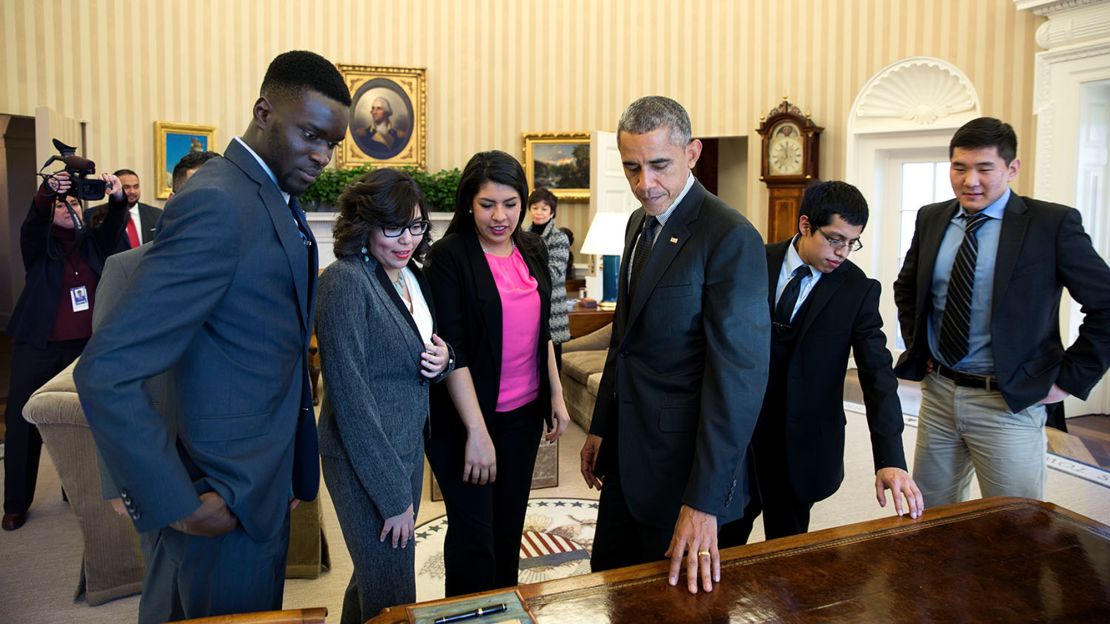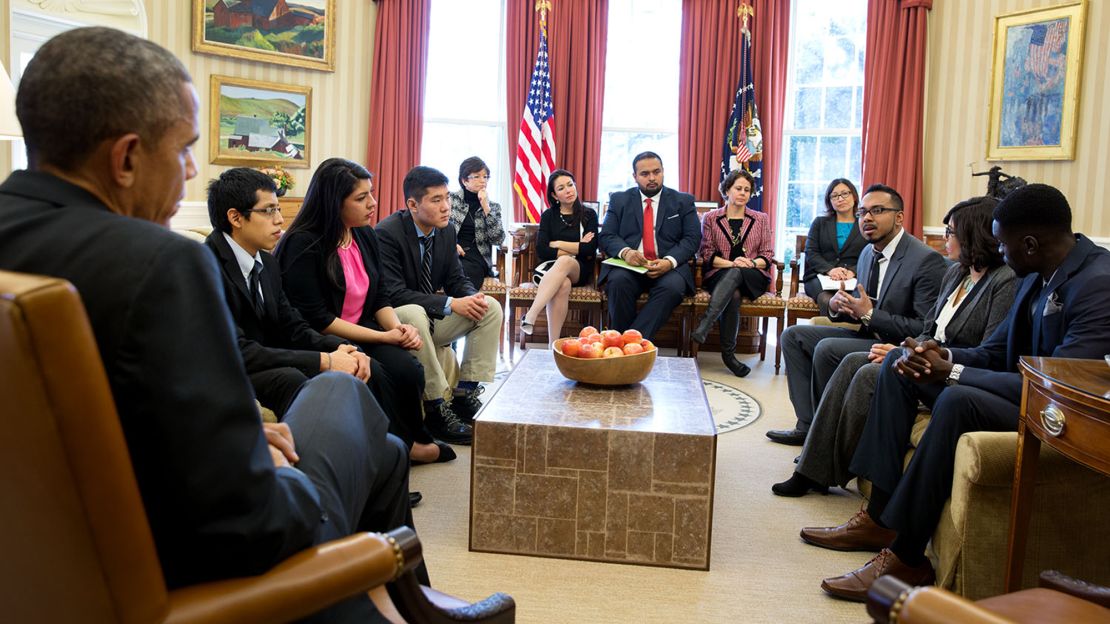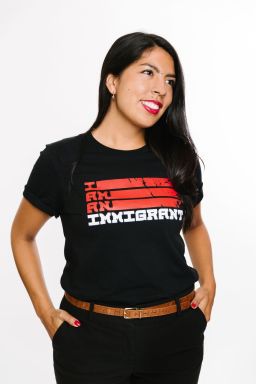Blanca Gamez uses one word to describe the day the President of the United States opened the door to the Oval Office and invited her inside: insanity.
“That doesn’t happen to regular individuals,” she says, “especially people who are undocumented.”
The scene that February morning more than two years ago would have been unimaginable a decade earlier. Gamez was one of six undocumented immigrants meeting face to face with then-President Barack Obama.
The official White House photographer chronicled the visit, capturing images that showed the group telling Obama how his Deferred Action for Childhood Arrivals program had changed their lives.
The program gave so-called Dreamers, young undocumented immigrants brought to the United States as children, temporary work permits and protection from deportation.
Now, tens of thousands of DACA recipients have only hours left to file renewal applications before the Trump administration stops accepting them.
As that deadline looms and lawmakers debate whether to keep protecting these immigrants from deportation, CNN caught up with several of those who met Obama to see where they are now and how they feel about their future in the United States.
‘Everything’s different’
Back then, Gamez was living in Las Vegas, a recent college graduate with bachelor’s degrees in political science and English. She thanked Obama for creating the program that helped her land her first job as a nonprofit caseworker. Now 28, she lives in Washington DC, and works as a digital organizing strategist for the ACLU. Her office is just a few blocks from the White House.
The building she once saw as warm and welcoming now carries another meaning for her.
“It’s a different feeling now,” she says. “Now I go over there to protest and shout outside the White House because … everything’s different.”

Gamez’s parents brought her to the United States from a small town in Mexico’s Sonora state when she was an infant. She’s one of nearly 700,000 people facing an uncertain future after the Trump administration’s announcement last month that it’s ending DACA. If Congress doesn’t pass a permanent fix, her protection from deportation will expire in November 2018.
“There’s a constant fear in the back of my head. I still have a year. A lot of things can happen, and things can change,” she says. “And it’s a whole different feeling knowing that the White House is literally two or three blocks away from my office.”
But Gamez says she’s trying to stay focused on the present rather than panicking about the future.
“Even the President is saying Congress needs to take action,” she says. “That’s something that I’m still hopeful for.”
‘A complete 180’
In remarks to reporters after the 2015 meeting, Obama offered what he said was a message for Dreamers across the country about his plans to expand DACA: “I want you to know that I am confident in my ability to implement this program over the next two years, and I’m confident that the next President and the next Congress and the American people will ultimately recognize why this is the right thing to do.”
Fast forward to 2017.
Obama’s DACA expansion, which would have protected millions more people from deportation temporarily, was blocked by the courts and never implemented.
And last month the Trump administration announced plans to end DACA altogether.
For Rishi Singh, being invited to the White House that day in 2015 was a “surreal moment.” And now, he says, it feels like Washington has done “a complete 180” when it comes to immigration.
But there’s still a lesson to be learned, he says, from that photo of him and other Dreamers meeting with Obama. The meeting itself never would have happened if it weren’t for years of advocacy work persuading politicians to take action.
“I don’t believe in politicians and their willingness to do what is right,” he says. “I believe in the ability of people in our communities to put pressure and organize and make the change we need to see in our communities.”

Singh, 32, is the director of youth organizing for New York-based DRUM, which advocates for South Asian immigrant workers and their families.
His family brought him to the United States from Trinidad on a tourist visa when he was 10, and it wasn’t until he was finishing high school, he says, that he learned he was undocumented. A decade later, DACA gave him a chance to get a job and health insurance.
“I bought a car. I was thinking about buying a house. All these different things, now I’m not even sure what’s going to happen. It just puts people in a limbo,” he says. “But even though things look really bleak right now, there’s also a lot of opportunities to come together.”
CNN Money: DACA’s end could kill these small businesses
Singh says immigrant communities are resilient and will endure, even as the Trump administration enacts tougher policies.
“We’ll figure out ways to continue to survive, and hopefully thrive, and continue to fight to make sure that we don’t have to live in that fear or in the shadows,” he says. “That’s what the administration wants to do, continue to fearmonger and push people underground. If we allow that to happen, then they win.”
‘It’s going to require more work’
When she met Obama, Maria Praeli says, she told him about the moment she knew she wanted to devote her life to fighting for immigrants’ rights: the day of her grandmother’s funeral.
Praeli’s mother, an undocumented immigrant, couldn’t fly back to Peru to attend. Instead, she watched the service on an iPad from Connecticut.
“I still vividly remember my mom hugging the iPad and screaming and crying about her mom,” Praeli says. “It really opened up my eyes to the reality that many people have to live with every single day. This issue wasn’t about me not being able to drive, or not being able to go to the college of my choosing, this issue was about a really broken system.”
More than four years later, Praeli says the system is still broken – and she’s more determined than ever to keep pushing politicians to fix it.
“It’s hard, because things have been so negative lately. We’ve heard things on the campaign trail, and we’ve seen things under this administration. But the President himself has also called for comprehensive immigration reform at some point, so I’m still hopeful,” she says. “I just think it’s going to require more work.”

Praeli, who was 5 when she came to the United States from Ica, Peru, is now an immigration policy associate at FWD.us, an advocacy group started by Facebook CEO Mark Zuckerberg and other tech leaders.
The 24-year-old is one of more than 150,000 Dreamers facing this week’s deadline. Her DACA protection is set to expire early next year, meaning she falls into a group that has until the end of the day Thursday to submit renewal paperwork. They’re the last Dreamers who can file to renew before DACA ends under the Trump administration’s action.
Praeli says she’s sent in her application and gone to an appointment where officials recorded her biometric data.
“Now it’s just kind of a waiting game,” she says.
She has plenty to keep her busy while she waits to hear if her renewal is granted.
This week, more than 100 Dreamers from across the United States traveled to Washington, just as she did when she met with Obama back in 2015.
The group met face to face with members of Congress.
This time, Praeli was looking on from behind the scenes. She helped organize the visit.






